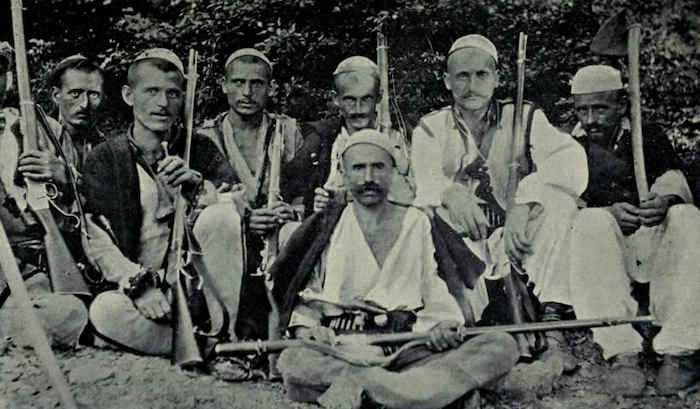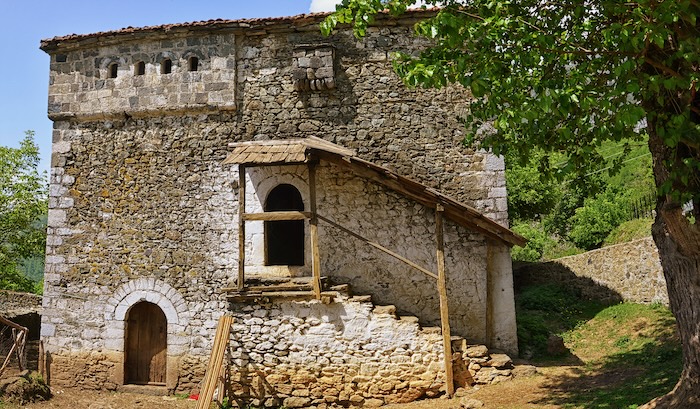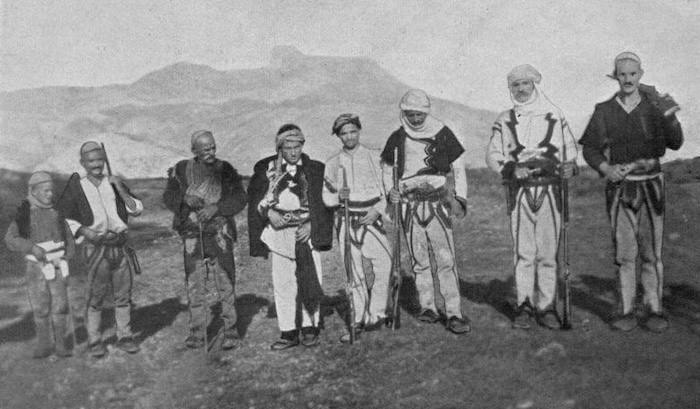Before the arrival of state control in the 1920s, highland Albania had a highly-developed culture surrounding blood feuds. There was a particular way these feuds were supposed to be conducted, but all rigid customs turn out to be enormously variable when you dig into individual cases. One gray area surrounding Albanian blood feuds was hiring outsiders to participate in the place of the people who were supposed to be avenging their dead relatives. Getting hired into a fictional blood feud is a great RPG adventure hook.
This post is brought to you by beloved Patreon backer Arthur Brown. Thanks, Arthur—you rock!

Highland Albanian blood feuds were mostly begun by a murder. The details varied across time and place, but generally boiled down to an eye for an eye. If one man was killed, the family wronged (the avengers) needed to kill one man from the murderer’s family. This death had the option of closing the feud. However, the murderer’s family was within its rights to avenge their dead family member by killing a second member of the avenging family, which would then be required to kill a second member of the murderer’s family. Each feud was (theoretically) about only one killing at a time. If in the act of retaliation an extra person was killed, that opened a second, different feud whose resolution did not impact the original feud (theoretically). Each feud could be ended when both sides had lost the same number of men, but—even if the families were square—the last family to lose a member always reserved the right to reopen the feud by killing again.
Answering or continuing a feud often involved a posse. The man (we’ll talk about women shortly) who was supposed to avenge the most recent killing was ideally the victim’s brother, but his son, father, blood brother, paternal uncle, or paternal cousin could also do in a pinch. This man might round up his or the dead man’s relatives, servants, and tenants to go hunting. If you were asked to participate in a posse you had to say yes, but if you volunteered without being asked, you earned prestige. If the posse found and killed someone from the opposing family, regardless of who fired the shot, the killing was ascribed to the posse’s leader. Members of the posse who were not family members of the person being avenged were not fair game for later retaliation, even if they actually fired the killing shot. At least that was the theory. In practice, human relationships are necessarily variable and messy.
Women were barred from participating in blood feuds, partially because of a cultural taboo on women carrying guns and partially because they weren’t valid targets for retaliation. Naturally, this didn’t always stop people. The father of Emin of Orenjë was killed when she was an infant. The only men left in the family were her four cousins, who were in no great rush to avenge the murdered man. So when she was fifteen, she secretly bought a rifle. The next time her enemy came in range of her window, she killed him. This made the four cousins look bad. And since women can’t participate in feuds, this killing didn’t count as being part of the feud over the death of Emin’s father, but was the start of a second feud, which would necessarily take the life of one of the four cousins.
Different targets invoked different rules. If a Catholic priest were killed, his whole congregation was permitted to avenge him as though they were his brothers. Imams and Orthodox priests were not afforded the same privilege, and could only be avenged by their families. Women and children were right out as targets, and for that reason you couldn’t burn your target’s house down with them inside, lest there be women and children in there with him. In some districts, if the person being avenged was of a substantially higher social rank than his killer, two deaths might be needed to answer for the initial murder, and this would not open a second feud. If the person being avenged was much lower-ranked than his killer, the dead man’s family might only be able to demand a blood-payment instead of seeking blood for blood.

Credit: Pasztilla aka Attila Terbócs, released under a CC BY-SA 4.0 license.
Hiring people to fight your feud was acceptable in some times and places, especially if the avenging family had few fighting-age men left to pursue a feud, or even none at all. While volunteering to help in a feud was honorable, taking money for it was not. Thus, hirelings often came from among the disreputable: families of men who’d violated some social norm, vagabonds, and especially Roma. Fortunately for us, “disreputable travelers willing to do violence for money” describes quite a lot of RPG parties.
Accepting a job as a feud hitman wasn’t without its dangers.
First, the target might fight back.
Second, while credit for the kill should go to the person who did the hiring, sometimes that person couldn’t be found, or some time would go by without vengeance being taken upon him. In such cases, the hireling might be killed as the next best thing.
Third, in some parts of the northwest it was felt that anyone who hired an outsider to fight for him must be a witch. Since witches lay outside the blood feud system, by killing their target the hireling started a new feud unrelated to the one they were hired into. The hireling would be the target of retaliation in this new feud.
Fourth, there was always the very real chance the family of the man the hirelings killed would refuse the norms of the feud. Spiro Toli of Shënjon was so insulted when his brother was killed by a Roma hireling that he killed the hireling and the hirer both.

At your table, this adventure hook couldn’t be more straightforward. The party is approached by a representative of a family whose only fighting-age member was just murdered. The family’s culture demands they retaliate, so they must hire outsiders: the player characters. Make the victim’s family sympathetic and the murderer’s family unsympathetic and see if the players will go for it.
Then things go sideways pretty much immediately. The target is sheltering in his well-fortified house and will have to be drawn out—whereupon he turns out to be a much tougher fight than advertised. The dead target’s family then wants to retaliate. There are no valid targets among the family that hired the party. So the target’s family decides the hirer must be a witch, which gives the family license to go after the PCs.
If the players are smart, they’ll see something like this coming. Murder-for-hire in an unfamiliar culture is just not likely to end well. If the PCs dig into the situation before they commit, they may discover a second tilt to the story: the hirers are actually well-positioned to be helpful and valuable friends to the party. It’s actually worth it to take this job. Otherwise, this adventure hook is liable to be counterproductive. If it’s just bad news and the players figure that out, you’ll have prepared an adventure for nothing. And if the players don’t figure out the adventure is only bad news, then that revelation might come across like an unpleasant rug pull. “You trusted me, you dummies!” said the GM. But if there’s a long-term payoff beyond the immediate payday, then the adventure is fun and should slot well into your ongoing campaign.

As a closing note, I’ve been using the past tense through this post because I’m focusing on the historical aspects of the feud culture. But it’s worth noting that, for some families, blood feuds continue today. A 2018 review found 704 families in Albania that are still affected by blood feuds, with some members (even children) unable to leave the house for fear they will be shot.
Make sure you don’t miss a blog post by subscribing to my no-frills, every-other-week mailing list! I also have a signup that’s only for big product releases!
Looking for material for your game tonight? My back catalog has hundreds of great posts, all searchable and filterable so you can find something from real history or folklore that fits exactly what you need!
Come follow and chat with me on social media! On Bluesky, I’m @moltensulfur.bsky.social. On Mastodon I’m @MoltenSulfur@dice.camp.
Check out Shanty Hunters, my award-winning TTRPG about collecting magical sea shanties in the year 1880, then singing them at the table with your friends. The lyrics of the shanties come to life and cause problems for you and for the crew of the ship you sail aboard. It’s up to you to find clues in the song and put things right!
Source: The Albanian Blood Feud by Margaret Hasluck, in Law and Warfare, edited by Paul Bohannan (1967)







